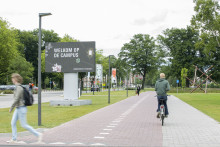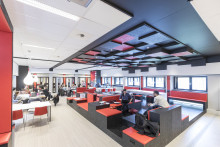A postal code analysis shows that 76 percent of UT employees live within a 15 kilometre radius of the campus. Good distances to travel by bike, says sustainability officer Brechje Maréchal. 'Especially in view of the developments in recent years with the availability of e-bikes and speed-pedelecs.'
According to Maréchal, it was a logical decision to join the national cycling mission. 'The Ministry’s initiative focusses on stimuli to get more people cycling rather than on strict deadlines. We already had plans and it fits in with the new UT strategy. An important reason to commit to this mission is the opportunity it offers to exchange knowledge and best practices with other companies and institutions.’
Together with business travel, commuting accounts for a significant proportion of the UT's CO2 emissions. Together, this amounts to more than 31% of the total UT emissions, Maréchal knows. 'That's why we think we can win a lot if more people take the bike. We will offer support, through good facilities, attractive regulations and stimulating initiatives.'
Persuade people to cycle
Efforts are increasingly being made., . HR is also currently looking at adjusting the Optional Model. And last year, we offered a small-scale pilot with speed-pedelecs, after which a number of colleagues actually purchased such a bike. This also shows that, in a sense, you have to persuade people to take the bicycle more often. We may organise such pilots much more often, so that more people get a feel for it.' There are developments outside the UT as well. 'Think also of the construction of cycling highways and traffic lights that turn green more quickly for cyclists when it rains.’
In addition to sustainability aspect at the environmental level, there is also a bit of personal sustainability and wellbeing as a plea for cycling, says Maréchal. 'People are sitting still more and more, while we want pursue a healthy campus community. Cycling to work is a way to fit exercise into your daily routine.' But, she says, getting every UT employee on a bike is a utopia. 'It has to be reasonable; it may also be that someone's health doesn't allow it. Or the combination with picking up children or family care cannot be fitted in. Maybe it's not possible for a particular group to cycle to campus all week, but it might be possible a few days a week.'
New mobility research
Nevertheless, the UT is certainly not doing too bad. The latest mobility survey dates back to 2011, when 53% of employees indicated that they came to the campus by bike. 'Compared to Kennispark or the national average, we are doing well,' says Maréchal. 'But we want to set up a new mobility study in order to get as complete a picture of the situation as possible - when we have a regular situation again. In any case, I am convinced that there is enough room to achieve that 10% growth. But it is not that we stop after that; we want to do as much as possible.'







